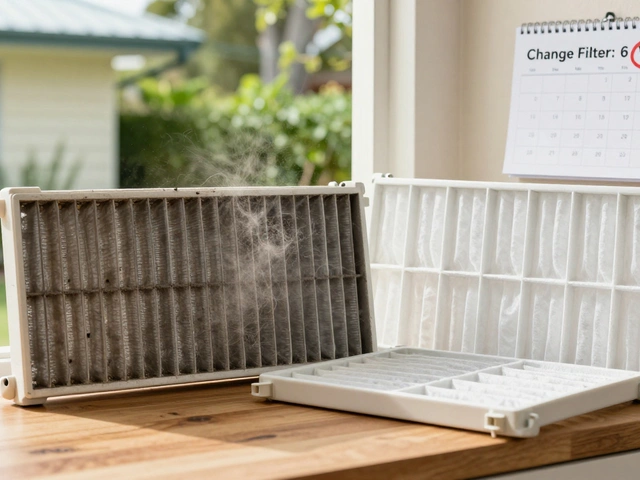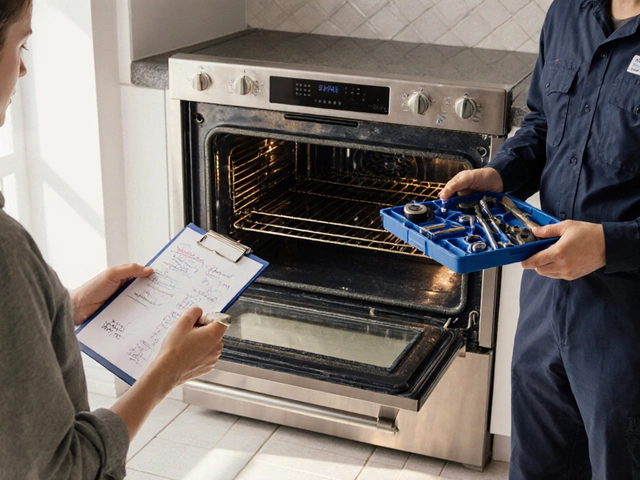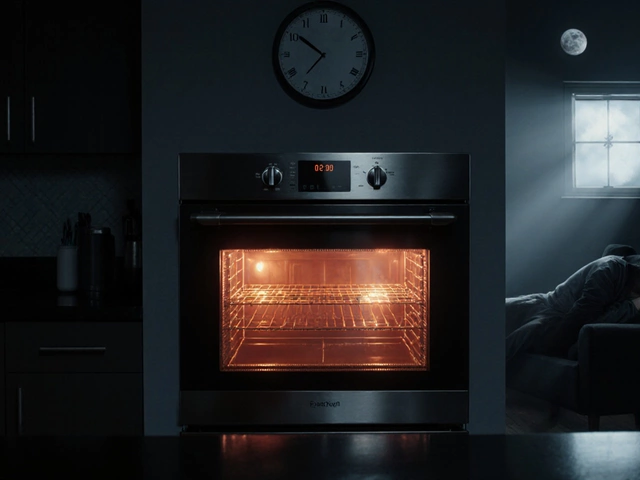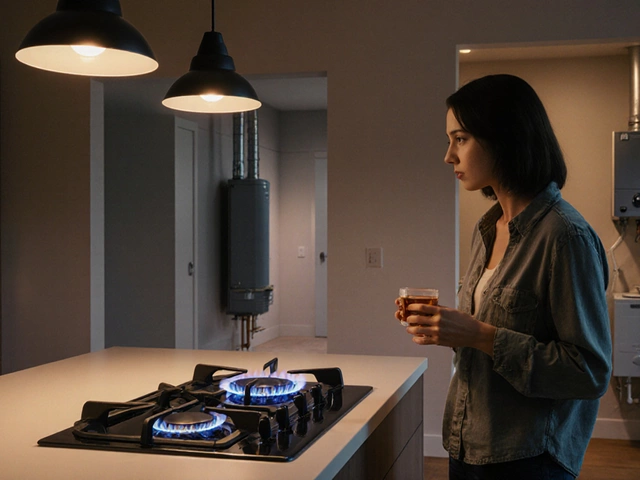Electric ovens are the unsung heroes of the kitchen, dutifully handling everything from breakfast bakes to holiday roasts. But just like any hardworking kitchen appliance, they have a lifecycle. Knowing how long an electric oven should last helps you gauge whether it’s nearing its final bake or if it's got more goodies to offer.
There are several factors that can affect the longevity of your electric oven. From how often you use it to the quality of maintenance it receives, these all play a part in its lifespan. Let’s dive into some practical tips to ensure your oven keeps contributing to culinary adventures for the maximum period possible.
- Understanding Electric Oven Lifespan
- Factors Affecting Longevity
- Routine Maintenance Tips
- Signs Your Oven Needs Repair
- When to Consider Replacement
- Selecting a Long-Lasting Electric Oven
Understanding Electric Oven Lifespan
When you're counting on your electric oven day after day, the question of how long it should last is bound to pop up sooner or later. Typically, a well-maintained electric oven enjoys a lifespan of around 13 to 15 years. However, numerous variables can tip the scales in either direction, stretching that period longer or curtailing it sooner than expected. From choosing the right model to ensuring regular upkeep, everything plays a part in how long your trusty oven stays with you.
First off, the brand and model of your electric oven can make a significant difference. Some higher-end brands are renowned for their durability and performance, often boasting advanced features that can extend the appliance's life. Notably, consumer reports often reveal that certain models are designed to withstand the test of time, showing fewer issues over the years compared to base models. Selecting a reputable brand can be a crucial first step toward a longer-lasting oven.
Usage is another vital factor in determining an oven's lifespan. If you find yourself baking regularly, hosting parties, or whipping up a feast for family get-togethers, it's only natural to see a gradual decline over the years as opposed to occasional use. It's much like an athlete constantly on the run, always needing a bit more care and frequent checks to keep performing well. On the other hand, lighter use can help extend its life, giving it a chance to 'rest' without continuous wear and tear.
Then there's the maintenance aspect, often a make-or-break factor for any household appliance. Regular cleaning and timely repairs can have a profound effect on longevity. Ensuring that minor problems are addressed before they evolve into significant issues keeps the appliance running smoothly. It's a commitment worth investing time in—if not for anything else, then at least for the delicious foods it helps bring to life.
For those who are keen on numbers, it's interesting to note that industry surveys have indicated a minor yet notable difference in lifespan between gas and electric ovens. Electric variants, on average, tend to last a smidge longer, thanks in part to their fewer moving parts. Although precise data can vary, this tidbit offers some peace of mind knowing that the electric version is designed to hang in there for the long run.
"The secret to longevity, not just for us, but for appliances we rely on, is care and attention," says renowned appliance expert Jamie Billson. He emphasizes, "Never underestimate the power of consistent maintenance and choosing quality upfront."
Factors Affecting Longevity
When it comes to the lifespan of an electric oven, several notable factors come into play. These elements can substantially sway how long your trusty oven will last before it might need some serious attention or even replacement. Understanding these factors can help in stretching out your oven's service time and getting the most bang for your buck. One of the primary influences is the frequency of use. An electric oven that's fired up more regularly will generally have a shorter life span than one that’s used sparingly. It's much like the difference between a well-loved book and one that sits in pristine condition on the shelf; constant use means more wear and tear.
Maintenance also plays a significant role in appliance longevity. Regular cleaning, whether it's the occasional wipe down or more in-depth cleaning sessions, affects how long your oven will remain in optimal condition. A clean oven's parts are less likely to suffer from the build-up of grime that can cause components to wear out prematurely. It's not just about aesthetics; it's about preventing grit from causing a breakdown. And speaking of components, the quality of these parts when your oven was made can also influence longevity. Appliances with high-quality parts often outlast those with more budget-friendly components.
Environmental factors shouldn't be overlooked either. An oven located in a humid environment might face unique challenges, like rust or corrosion, compared to one in a drier location. Such factors can diminish its service life significantly. Additionally, the electrical quality, like consistent voltage levels, can affect operation efficiency and wear. Good installation practices, such as proper alignment and an adequate electrical supply, can preemptively solve many potential problems.
Brand and Model
Anyone shopping for a new electric oven today will likely notice the variation in suggested life spans among different models. Some of this is tied back to brand reputation and the quality linked with it. According to repair technicians, certain brands are known for their durability due to their use of robust construction materials and innovative designs. As a result, these brands might warrant a higher initial investment for a longer-term payoff.
According to Consumer Reports, "The best ovens are evaluated not only on their features but on how they balance durability and performance over time." This means selecting an oven is about more than immediate features—consider how its build quality may extend its useful life.
| Factor | Impact on Longevity |
|---|---|
| Usage Frequency | High use can decrease lifespan. |
| Maintenance | Regular maintenance extends lifespan. |
| Component Quality | High-quality parts last longer. |
| Environmental Conditions | Humid environments may reduce lifespan. |
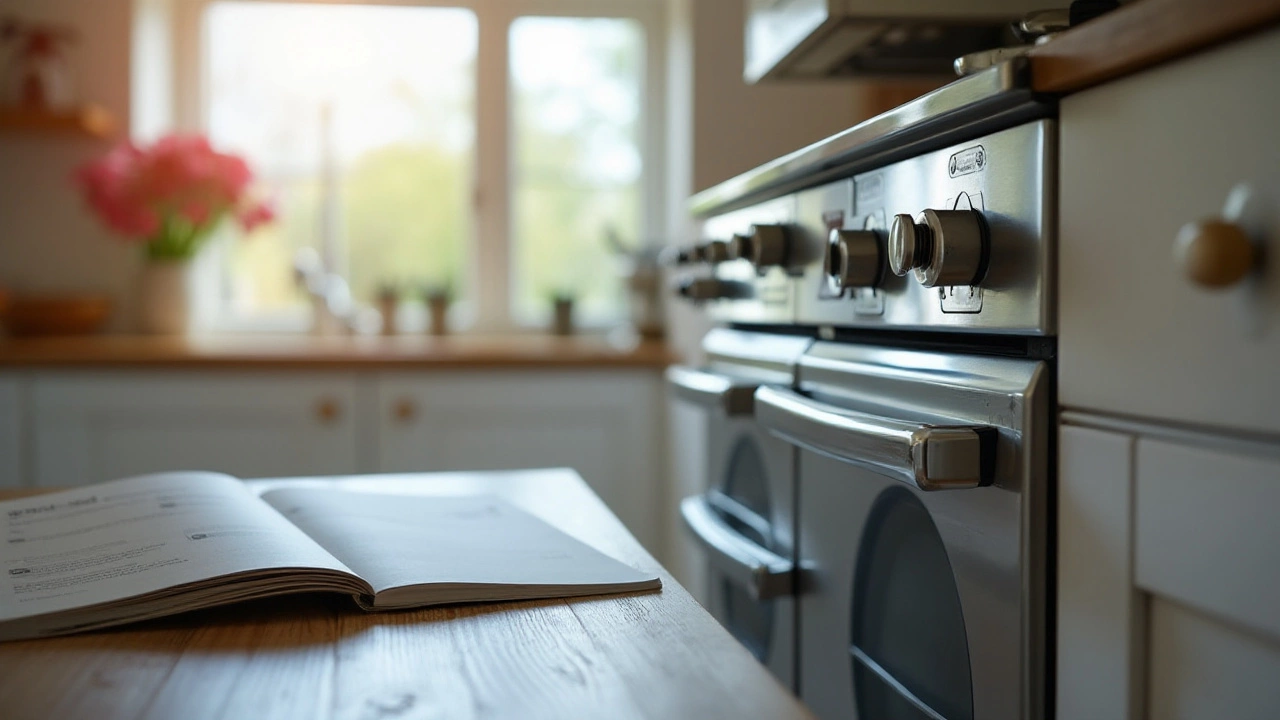
Routine Maintenance Tips
Keeping your electric oven in top shape is easier than you might think, but it does require some regular attention. While these appliances are designed for longevity, the reality is that neglect can significantly shorten their lifespan. By incorporating a few simple maintenance practices into your routine, you can greatly improve your oven’s efficiency and durability. Start by cleaning your oven regularly. Residue and grease build-up can lead to poor performance, and over time, can affect the heating elements. Utilize the self-cleaning feature if available, but remember to follow the manufacturer's instructions to avoid damage. Simply wiping down interior surfaces with a damp cloth after each major use can make a significant difference.
Another crucial yet often overlooked aspect of oven repair is checking the gaskets and seals. These components ensure that heat stays inside the oven when baking or roasting. A simple visual inspection for wear or brittleness can prevent unnecessary heat loss and inefficiency. If you notice gaps or tears, it might be time for a replacement. Many problems arise from worn-out gaskets that cause stress on other parts as the appliance compensates for lost heat. Oven maintenance also extends to the heating elements. If your oven features replaceable elements, it’s wise to inspect them periodically. Signs that they may need attention include uneven cooking and longer preheating times. A quick look at the owner’s manual can guide you on how to replace these parts if necessary.
Don’t forget to pay attention to the exterior of your oven. Keeping knobs and handles clean and ensuring they are not loose not only maintains appearance but also functionality. A loose knob can result in misjudging heat settings, which over time, could lead to damaged internal components. A mild detergent and a soft cloth can keep these parts polished and functional. Regular maintenance is not just about extending the life of your oven; it’s also about safety.
As noted by Consumer Reports, "Keeping appliances regularly maintained not only prolongs their life but also ensures they operate safely and efficiently."It’s particularly important to ensure that the oven is always unplugged or turned off from the power source when you are performing inspections or any cleaning that involves reaching into the appliance.
Routinely checking for burnt-out oven lights can also help. Not only do they improve visibility, but they also aid in catching problems early, like noticing uneven cooking or elements that aren't glowing as they should. Replacing an oven light is a simple DIY task that can prevent larger issues. An easy way to remember this could be to check the light every time you change the batteries in your smoke detector. Electric ovens are durable investments, but consistent care is vital to preserving their performance. By dedicating a little time to these tasks each month, you can ensure that your oven remains a key asset in your culinary ventures. Whether it's adjusting shelves to maximize air circulation or simply giving it a thorough cleaning, a bit of regular attention goes a long way.
- Clean spills immediately
- Use oven cleaner monthly
- Inspect heating elements
- Check door seals
- Replace burnt-out lights
With a little diligence, your electric oven lifespan can reach its full potential, continuing to deliver delightfully cooked meals time and again.
Signs Your Oven Needs Repair
Your electric oven isn't just a kitchen appliance—it’s a vital piece in the puzzle of keeping your household running smoothly. But like any appliance, it doesn't last forever without hitting a few speed bumps. Recognizing telltale signs that your oven might be on the fritz can save you both time and money in the long run.
One key indicator that your electric oven might need some attention is inconsistent heating. Perhaps you've noticed your famed chocolate chip cookies taking longer to bake or that roast chicken coming out undercooked. Such inconsistencies might suggest that the oven's thermostat is malfunctioning or the heating elements need replacement. These electric oven issues are often fixable when caught early, so don't wait until your dinner party centerpiece is jeopardized.
Strange noises are another clue that something’s amiss. While no oven operates in complete silence, unusual sounds like banging, buzzing, or even hissing should raise red flags. These can be symptomatic of a faulty fan or issues with the motor. Addressing these problems head-on can prevent a costly and inconvenient total breakdown down the line.
The scent of burning plastic or an unfamiliar odor can also be alarming and deserves immediate attention. This could stem from wiring issues or from melted parts inside the appliance. When it comes to anything that smells burnt, there's no room for hesitation—it's best to turn off your oven and consult a professional right away to avoid any potential safety hazards.
Another sign to watch for is the oven door not closing properly. A door that refuses to seal correctly might be due to worn out hinges or a compromised gasket. This defect can lead to inefficient energy use and uneven cooking. Replacing these parts can be a straightforward fix but ignoring it could mean greater problems later on. Suddenly, that age-old adage, 'maintenance goes a long way,' starts making a lot more sense than ever.
Modern ovens often come with digital controls and displays. If these start malfunctioning—showing unusual error codes or failing to respond—it’s more than just frustrating. It signals potential electronic component issues that might require professional intervention. Electrical faults aren’t just an inconvenience; they’re a fire risk, elevating the importance of addressing them promptly.
Sometimes, the best course of action is consulting the appliance's manual for any diagnostics it might offer. They’re not just decoration or fire starters; they’re loaded with useful information and troubleshooting tips. Keeping an eye out for these signs and acting promptly will not only prolong the lifespan of your beloved oven but also keep your peace of mind intact.
“Addressing small signs of wear and tear on your appliances, such as an oven, prolongs its life by almost 30%, allowing you to bake for years without unnecessary costs.” – Appliance Experts Weekly
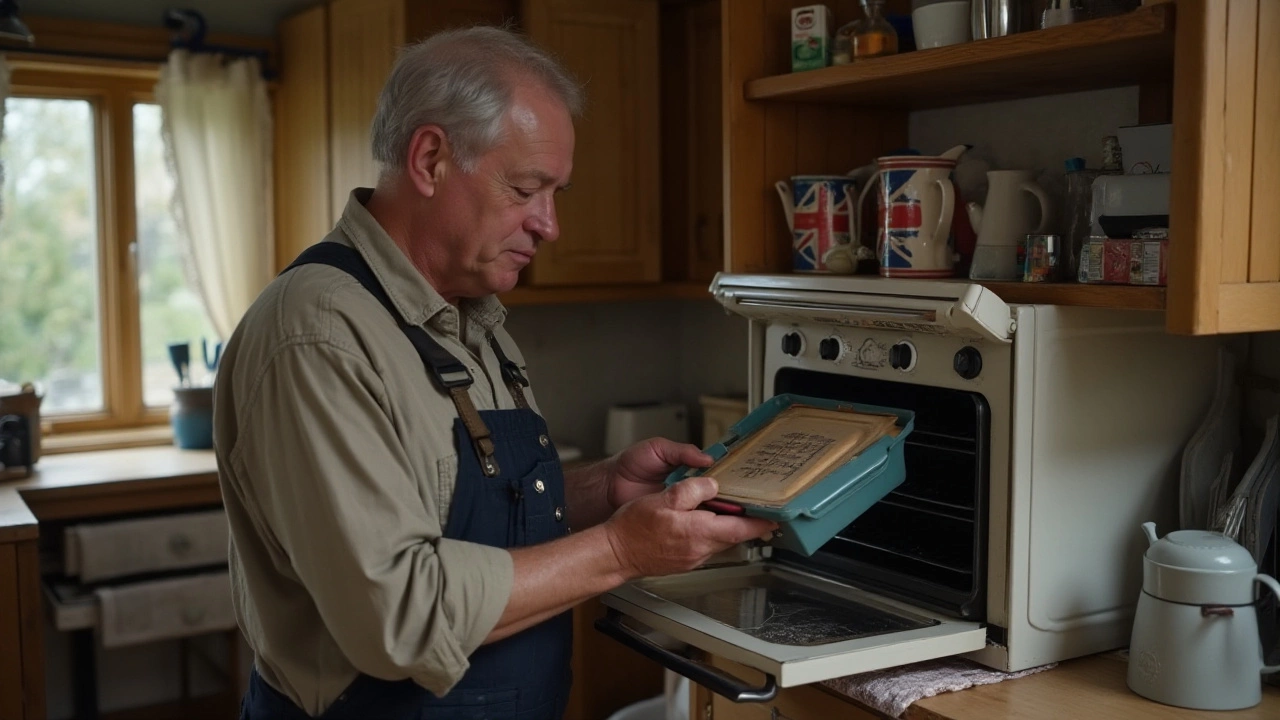
When to Consider Replacement
Replacing an electric oven isn't something most people want to think about often, especially given the appliance's importance in daily cooking. However, like many appliances, they have a point where repair costs start to outweigh the benefits, or safety could become a concern. Typically, a well-maintained electric oven might last anywhere from 13 to 15 years. However, several signs might suggest it’s time to look into getting a new oven. For instance, if you find that your oven is taking much longer to preheat than it used to, or it struggles to hold the correct temperature consistently, these could be signs that need attention. Often, recalibrating your oven’s thermostat might do the trick, but if that doesn’t help, it might be time to consider other options.
Another aspect to consider is the frequency of repairs. Occasional fixes are part of owning any appliance, but when you find yourself constantly contacting service professionals, it can be a sign that your oven’s reliability is diminishing. It's common that as oven maintenance needs increase, so do repair costs, and they can quickly add up. This is particularly true for older models where parts might be rarer and pricier, or service technicians may struggle to find the appropriate components.
According to the National Association of Home Builders, "Most oven elements can be repaired or replaced, but when units repeatedly require parts, it often makes financial sense to invest in a new model."
Modern advancements in technology also deserve consideration when pondering a replacement. If your oven is over a decade old, newer models come equipped with various features that can enhance energy efficiency and cooking precision. Many new electric ovens are designed to use less energy, which can result in lower monthly utility bills and be more environmentally friendly. With additional functions like convection settings or self-cleaning cycles, a newer model might just add convenience to your cooking experience.
| Oven Age (Years) | Repair Frequency | Replacement Advice |
|---|---|---|
| 0-5 | Low | Repairs likely manageable |
| 6-10 | Moderate | Weigh repair costs |
| 11-15+ | High | Consider replacing |
Finally, don't overlook the safety aspects. Older ovens can present safety hazards such as electrical faults or even unique fire risks if internal wiring has degraded over time. If there’s an unpleasant burning smell that emanates despite regular cleaning or smoke appearing during normal operation, it’s best to consider these red flags seriously. Safety should never be compromised, so if repairs hinge on your oven’s functionality without wholly addressing these issues, opting for a new oven that meets current safety standards is wise.
Selecting a Long-Lasting Electric Oven
When it comes to ensuring your investment stands the test of time, picking a long-lasting electric oven is key. There are so many choices on the market, but knowing what features to focus on can make your decision much easier. One of the first things to consider is the build quality. Ovens made with robust stainless steel and high-quality components will likely endure wear and tear better than those with cheaper materials. Look out for models that promise durability with double-glazing and high-caliber insulation, which not only conserve energy but protect the oven's vital parts from temperature swings.
Moreover, it's crucial to assess the brand reputation. Brands with a track record of excellent customer service and reliable products can often be trusted to provide appliances that last. Doing a bit of research on reviews and consumer reports can go a long way. Many people find it beneficial to compare warranties offered by different manufacturers. An extended or comprehensive warranty often indicates confidence from the manufacturer in their product’s longevity. Before making a purchase, check how long the standard warranty is and what it covers, which might include specific parts like the heating element or digital controls.
Energy Efficiency and Innovative Features
Another significant factor is energy efficiency. Selecting an appliance with an excellent energy efficiency rating means you're not just saving on utility bills; you're also choosing an oven typically designed with advanced technology meant to enhance its lifespan. Also, an electric oven with smart features, such as Wi-Fi capability or self-cleaning options, could suggest a more up-to-date model. These modern conveniences often mean that the oven is fitted to handle the demands of contemporary tech-connected households.
According to Consumer Reports, "Electric ovens tend to have slightly longer lifespans than gas variations due to fewer heat influences on key components."
Finally, consider the size and capacity of the oven you need. A large oven might be appealing, especially for those who frequently entertain guests. However, bigger is not always better if it's too large for your everyday requirements. Opting for a size that matches your cooking habits will mean less strain on the appliance and better energy consumption, which in turn contributes to its lifespan.
The process of selecting a long-lasting electric oven might seem daunting at first, but focusing on key aspects like build quality, brand reputation, energy efficiency, and smart features makes the task easier. Take the time to understand these aspects, and you'll find an oven that fits your kitchen and stands by you through thousands of meals. So, whether the aroma of a homemade lasagna fills your kitchen or a quick batch of cookies is on the agenda, knowing your electric oven is reliable enhances the pleasure of cooking immeasurably.

